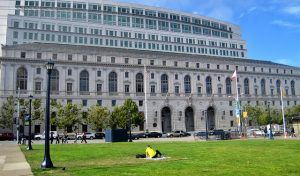 California local governments have long been stymied in efforts to raise taxes for basic infrastructure and services by California’s constitution. Two voter-approved constitutional amendments, Propositions 13 and 218, require that any new local “special tax” (i.e. for a specific purpose and not for general revenue for the government) receive two-thirds voter approval.
California local governments have long been stymied in efforts to raise taxes for basic infrastructure and services by California’s constitution. Two voter-approved constitutional amendments, Propositions 13 and 218, require that any new local “special tax” (i.e. for a specific purpose and not for general revenue for the government) receive two-thirds voter approval.
It’s a high bar that has made it more difficult for locals to fund transit, parks, and other specific needs. And when local governments do secure two-thirds support, the initiatives are often the result of promises to spread the revenue around to make as many voters happy as possible, rather than prioritizing efforts to spend the money as cost-effectively as possible (the two are not always synonymous).
So it’s potentially a big deal that the California Supreme Court ruled today that any city or county “general tax” measure (i.e. not one for a specific purpose like transit or parks) that is placed on the ballot via the initiative process (a petition signed by 15 percent of the city’s voters) is not bound by Prop 218 requirements. Because the same logic could easily apply to “special taxes” that otherwise require a two-thirds supermajority, it potentially opens the door for much easier approval of any new tax measure placed by special interests.
The facts of California Cannabis Coalition vs. City of Upland involve a nonprofit that secured enough signatures to get a medical marijuana initiative on the ballot in the City of Upland. The initiative included proposed fees on new dispensaries, but the city council concluded the fees would constitute a general tax that needed to be placed on the ballot at the next general election.
The case ironically ended up being moot for these parties, as the Upland ballot measure was defeated handily by city voters. But the Supreme Court wanted to rule on the question as to whether or not Prop 13 and Prop 218 meant to restrict all local tax measures placed on the ballot, regardless of they got there — or just the ones placed on the ballot by “local governments” (i.e. the city, county or local agency).
Ultimately, the court concluded that the voter initiative power can only be limited when measures like Prop 13 or Prop 218 specifically state that they’re limiting these powers. Otherwise, they only apply to government entities like a city council or transportation agency.
The result may now be that any citizen, nonprofit or business group that wants to place a sales tax measure or fee on the ballot for something like a new school or transit line may only need a simple majority voter approval, provided they can get enough signatures for their measure. And unless barred by some other law, I gather there’s nothing stopping agency representatives or elected leaders in their individual capacities from sponsoring these campaigns in ways that essentially amount to the city, county, or agency sponsoring the measure themselves.
As an example, take a transit sales tax measure in a place like Los Angeles County. In the past, the county’s transportation agency, LA Metro, has sponsored these initiatives under their state law grant of authority, and the county supervisors have approved placing them on the ballot. Due to Prop 218, they’ve required two-thirds approval.
But now suppose an elected leader who serves on Metro, or a nonprofit or business group closely aligned with Metro, wants to place such a tax measure on the ballot. Provided they can fundraise for the signature gathering (which would be expensive in a county as large as Los Angeles), they would now only need a simple majority approval at the ballot box. In short, this decision could be transformational for local “self-help” efforts to fund badly needed infrastructure projects.
Or as Jon Coupal, head of the pro-Prop 13 Howard Jarvis Taxpayers Association tweeted after the decision, described it:
CA Supreme Court rips huge whole in Prop 13 and Prop 218. Tax hikes by special interest groups may avoid 2/3 vote protection.
— Jon Coupal (@joncoupal) August 28, 2017
At a time when California is struggling to reduce emissions from the transportation sector due to growing commutes from the lack of housing and transit near jobs, this decision could be significant for finally allowing locals the flexibility they need to fund these investments. Under California Cannabis Coalition vs. City of Upland, local government finance for a host of environmentally significant projects, from parks to transit to infill housing infrastructure, may have just gotten easier to pass.
One thought on “The California Supreme Court “Rips A Huge Hole” In Props 13 & 218”
-
Pingback: California Supreme Court Confirms: They Ripped A Big Hole In Prop 13 & 218 | Ethan Elkind
Comments are closed.


